Caring for and Feeding Senior Horses
Meeting the Nutritional Needs of Aging Equines
By: Carolyn Hammer DVM, PhD | Updated July 29, 2025
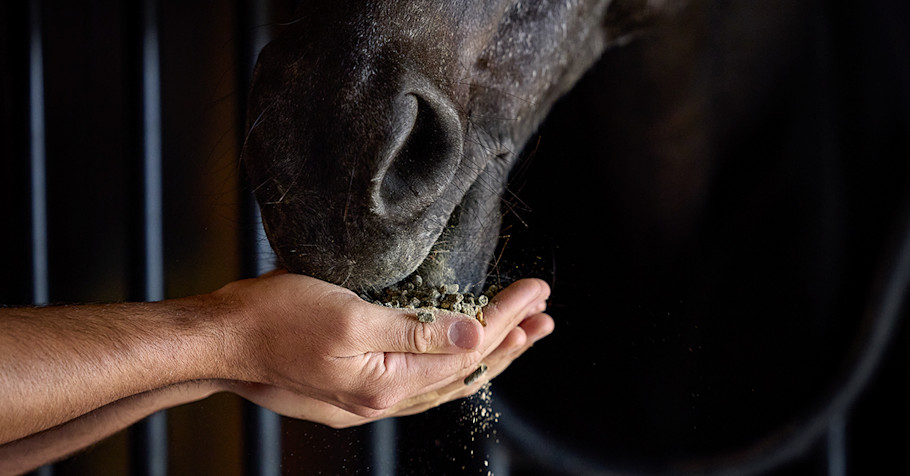
Proper nutrition is fundamental to the health and performance of horses at every stage of life. As horses age, their bodies undergo physiological changes that influence how they process nutrients, maintain body condition, and respond to disease. Just like aging humans, senior horses often require dietary adjustments to support their changing metabolic, digestive, and musculoskeletal systems. Recognizing and meeting these needs is key to helping your older horse remain active, comfortable, and healthy well into their golden years.
Recognizing When to Make Changes to Your Senior Horse’s Care
While there is no single age that defines when a horse will transition into their golden years, most equine veterinarians and nutritionists consider horses to be "senior" around the age of 15 to 20. Some horses may show signs of aging earlier, while others remain youthful well into their twenties.
It is important to note that calendar age alone should not dictate feeding changes for your senior horse. Instead, physiologic changes, such as decreases in body weight or body condition, loss of muscle mass, difficulty chewing hay, or a decline in energy or appetite may be signs that it is time to take a closer look at the diet.
Understanding a Senior Horse’s Changing Nutritional Needs
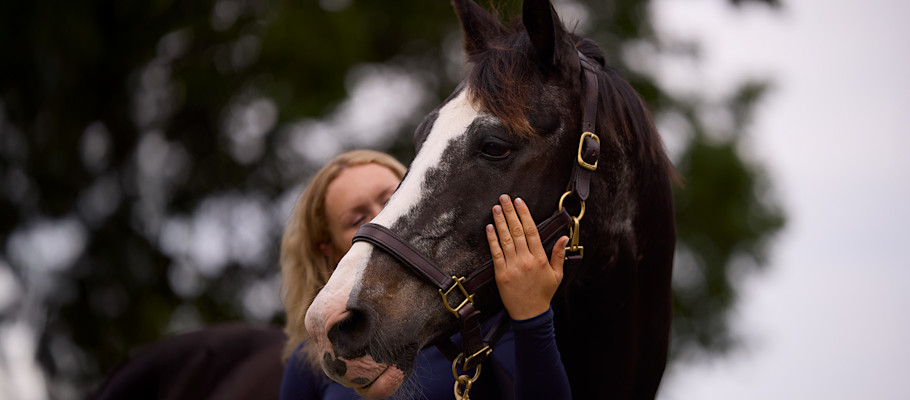
In the current National Research Council guidelines, there are no specific nutrient requirements for senior horses [6]. Although early research showed decreases in protein and fiber digestion in seniors, more recent research has shown that there is no difference in energy, protein, or fiber digestibility in healthy older horses compared to younger horses [2].
Regardless of specific nutrient efficiency, as horses age, there are several common challenges that can affect their ability to maintain optimal health and body condition [5]. These challenges include:
- Metabolic Disorders: Conditions such as Pituitary Pars Intermedia Dysfunction (PPID, or Cushing’s Disease), insulin dysregulation and Equine Metabolic Syndrome (EMS) are more common in older horses and can complicate feeding plans.
- Declining Immune Function: Seniors are more prone to infections and have slower recovery due to weakened immune defenses [3]. The weakened immune response also results in poorer responses to vaccination and deworming.
- Poor Dentition: Worn, missing, or diseased teeth can impair chewing and limit the types of feeds senior horses can handle. This impairment in the physical breakdown of the feed particles can decrease digestive efficiency.
- Weight Loss and Muscle Wasting: Many older horses struggle to maintain body weight and muscle mass. This can be caused by many factors, including digestive and mobility limitations, poor dentition, and chronic inflammation processes.
- Arthritis and Orthopedic Changes: Joint degeneration can reduce movement and lead to muscle loss and decreased access to food, especially in herds.
Monitoring the Health of Your Senior Horse
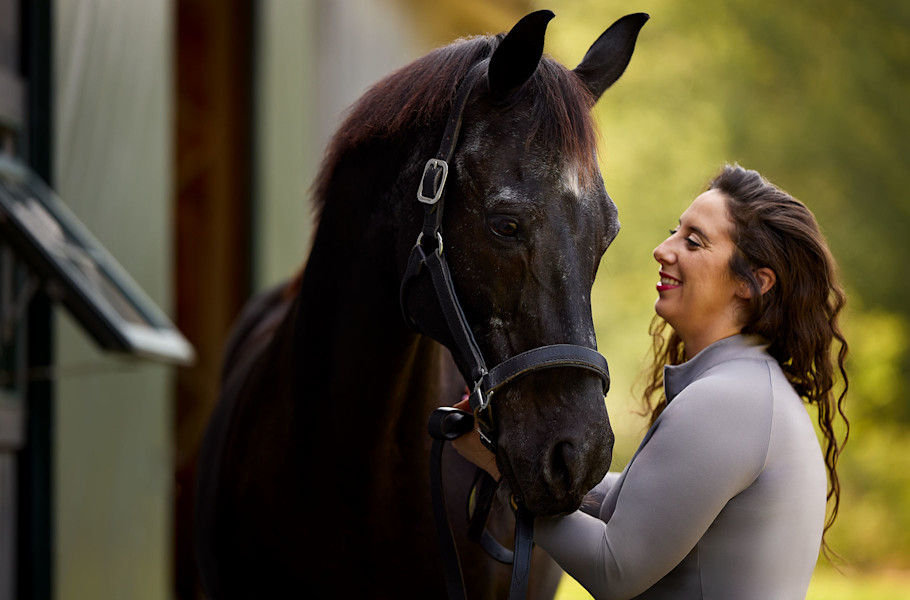
Body Condition Score
Regularly monitor your horse's body weight and body condition score to assess body fat coverage. If you don’t have a scale on your farm, a weight tape can be used to estimate body weight. You can also enter the weight tape measurements into our handy horse weight calculator to get an easy, quick estimate.
The Henneke body condition score system (1–9 scale) is widely used, with a score of 4–6 typically considered healthy. For older horses, maintaining a condition around 5 is often ideal. A weekly check of body weight and condition can reveal trends in weight or fat coverage and help guide feed adjustments.
Veterinary Care
Routine veterinary care is essential through all the phases of your horse’s life. A study by Herbst et al. [4] found that osteoarthritis, dental disorders, lameness, and PPID were commonly reported by owners of senior horses.
Regular physical exams, bloodwork (including testing for metabolic diseases), and dental checks help detect issues early and allow you to adjust nutrition accordingly. Routine vaccinations and parasite control also contribute to keeping your older horse healthy. An equine nutritionist can offer tailored feeding plans for your horse based on forage tests, diet analysis, workload, and health status.
Dental Care
Dental exams should occur at least once per year. Horses with dental issues may require more frequent exams. Horses with missing or damaged teeth may require feeding changes such as soaked feeds or pelleted diets to maintain weight. Mash-style meals made from complete feeds or soaked hay cubes are excellent for horses with compromised chewing ability.
Feeding Solutions and Practical Tips for Senior Horses
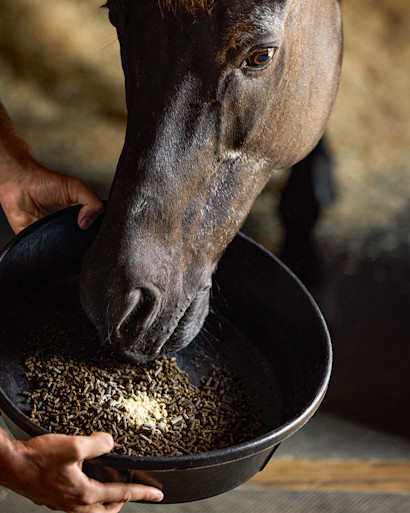
Successfully managing a senior horse’s health starts with understanding and addressing the common challenges mentioned earlier through practical feeding strategies and overall management [1].
Adjusting the Feed and Schedule
Maintaining weight in an older horse may require more frequent feedings of smaller, calorie-dense meals. Picky eaters may benefit from added fat (e.g., stabilized rice bran, flaxseed oil) or highly digestible fiber sources (like beet pulp). Balancing energy sources is crucial—fat and fiber are safer alternatives to sugar and starch, especially for horses with metabolic conditions.
Forage and Fiber Alternatives
As long as your aging horse still has good teeth, pasture grass and long-stemmed forage (hay) should be the major component of their diet. Steaming or soaking hay can reduce dust and sugars, which is helpful for horses with respiratory or metabolic concerns.
When chewing hay becomes difficult or your horse is missing teeth, alternatives and forage substitutes like hay cubes or pellets, chopped hay, and beet pulp can help meet fiber requirements. Hay cubes and pellets can also be soaked to form a mash to make them easier for horses to chew.
If you have specific questions, such as whether you should give alfalfa cubes or how much beet pulp to feed, speak with your veterinarian or an equine nutritionist who will consider your horse as an individual and make recommendations.
Commercial Senior Horse Feeds
Senior horse feeds are specially formulated to be highly digestible and nutrient rich. They typically include higher fiber, moderate protein, added fat, and controlled sugar/starch levels. Many are referred to as "complete feeds," meaning they may serve as the sole source of nutrition if a horse can’t chew hay.
When choosing a feed, look for guaranteed analysis labels that show digestible energy, crude fiber (at least 15%), and low non-structural carbohydrate (NSC) content for horses with metabolic issues. If you are unsure as to whether a feed is suitable for your senior, reach out to your veterinarian or an equine nutritionist to ensure your horse’s unique needs are being met. Also, watch this Ask the Vet video on when to switch a horse to senior feed.
Metabolic Management
Older horses with insulin dysregulation require diets low in sugars and starches. Avoid sweet feeds and prioritize feeds with <10–12% NSC. Consistent feeding schedules and limited grazing, especially during spring and fall, are crucial. A grazing muzzle may be a useful tool to help limit the amount of grass your horse is consuming while allowing them regular turnout time.
Many horses with PPID are prescribed the medication pergolide which may improve their metabolic and immune status. Ask your veterinarian if this treatment may be beneficial for your horse’s health.
Supplements That May Lend Support
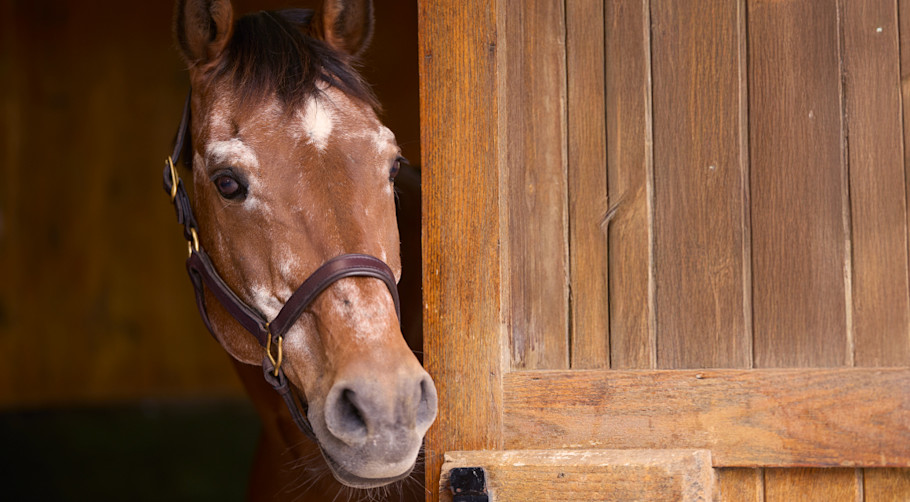
While not all horses require supplements, several ingredients in supplements can help fill nutritional gaps in older horses, particularly if they are not consuming enough forage or feed. Common ingredients in senior horse supplements include:
- Vitamin E and Selenium: Antioxidants to help neutralize free radicals and support muscle and nerve health.
- Omega-3 Fatty Acids: May promote a normal inflammatory response which contributes to joint, soft tissue, and skin and coat health.
- Probiotics and Prebiotics: Aid in digestion and gut health.
- Joint Supplement Ingredients: Glucosamine, chondroitin, MSM, and hyaluronic acid provide the building blocks for joint integrity.
- Mushroom Extracts: Mushrooms have immunomodulatory properties, which means that they can stimulate or suppress the immune system to keep it in balance. Further, mushrooms are made of beta glucans which may enhance the immune response by increasing production of disease-fighting white blood cells [7].
- Herbal Extracts: Devil’s claw, yucca, Boswellia, turmeric, and other herbal extracts may help support a horse’s comfort level through day-to-day stiffness.
- Adaptogens: American ginseng and other Adaptogenic botanicals may support a balanced immune response through stimulation of the body’s natural production of antibodies to fight foreign pathogens [8].
Always consult with a veterinarian or equine nutritionist before starting new vitamin, mineral, or herbal supplements to avoid imbalances or over-supplementation. For additional guidance in choosing the right supplement, our Customer Care Team is comprised of riders with extensive equine health and supplement education who are ready to put their smarts to work for you and your horse. Call 1-800-461-8898 for a free supplement consultation today.
Maintain Hydration
Access to fresh, clean water at all times is imperative. Older horses are at risk for dehydration, especially in cold or hot weather. Encourage water intake with warm water in winter and shaded water in summer. Electrolytes may be needed during exercise or sweating episodes, and soaked feeds may also increase water consumption.
Herd Dynamics and Access to Feed
Senior horses may be lower in herd hierarchy and have difficulty competing for access to feed. Offering feed in separate pens or stalls ensures all members of the herd receive their full ration without stress. Try to monitor your herd’s social behavior to prevent potential weight loss due to bullying or limited access.
Prioritizing an Older Horse’s Health and Nutrition
With thoughtful management and regular observation, senior horses can live healthy, comfortable lives well into their twenties and beyond. Age-related changes in dentition, metabolism, and mobility present challenges—but they can be managed with informed care. Regular assessment, proper feeding, and collaboration with your veterinarian can help ensure your aging equine partner continues to thrive, whether they are still competing or simply enjoying the life of retirement.
Evidence-Based References
- Argo, Caroline McG. “Nutritional Management of the Older Horse.” Veterinary Clinics of North America: Equine Practice, vol. 32, no. 2, Aug. 2016, pp. 343–54, https://doi.org/10.1016/j.cveq.2016.04.010.
- Elzinga, Sarah, et al. “Comparison of Nutrient Digestibility between Adult and Aged Horses.” Journal of Equine Veterinary Science, vol. 34, no. 10, Elsevier BV, June 2014, pp. 1164–69, https://doi.org/10.1016/j.jevs.2014.06.021.
- Fermaglich, Daniel H., and David W. Horohov. “The Effect of Aging on Immune Responses.” Veterinary Clinics of North America: Equine Practice, vol. 18, no. 3, Dec. 2002, pp. 621–30, https://doi.org/10.1016/s0749-0739(02)00027-5.
- Herbst, Alisa C., et al. “Owner‐Reported Health and Disease in U.S. Senior Horses.” Equine Veterinary Journal, Wiley, Aug. 2024, https://doi.org/10.1111/evj.14200.
- Ireland, Joanne L. “Demographics, Management, Preventive Health Care and Disease in Aged Horses.” Veterinary Clinics of North America: Equine Practice, vol. 32, no. 2, Aug. 2016, pp. 195–214, https://doi.org/10.1016/j.cveq.2016.04.001.
- National Research Council Committee On Nutrient Requirements Of Horses. Nutrient Requirements of Horses. 6th ed., Washington, Dc National Academies Press, 2007.
- Picetti TS, Soveral LF, Miotto R, Erpen LMS, Kreutz Y, Guizzo JA, Frandoloso R, Kreutz LC. “Orally administered β-glucan improves the hemolytic activity of the complement system in horses.” Vet World. 2021 Apr;14(4):835-840.
- Pearson, Wendy et al. “Low-dose ginseng (Panax quinquefolium) modulates the course and magnitude of the antibody response to vaccination against equid herpesvirus I in horses.” Canadian journal of veterinary research = Revue canadienne de recherche veterinaire vol. 71,3 (2007): 213-7.